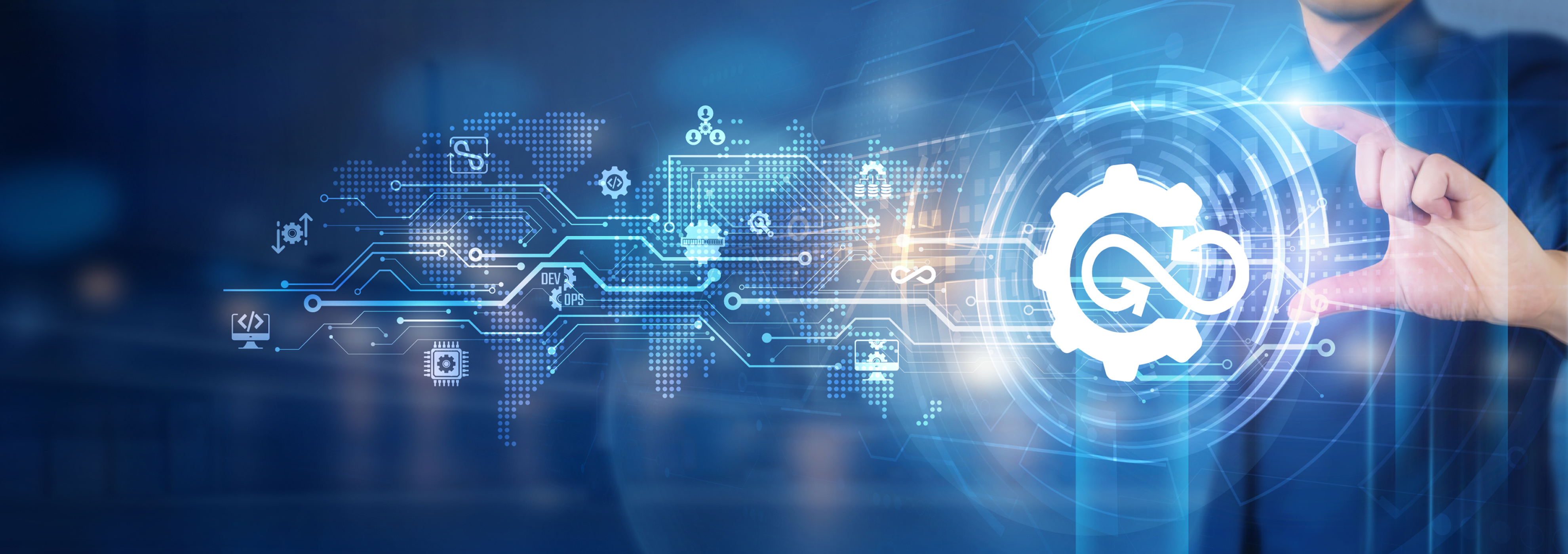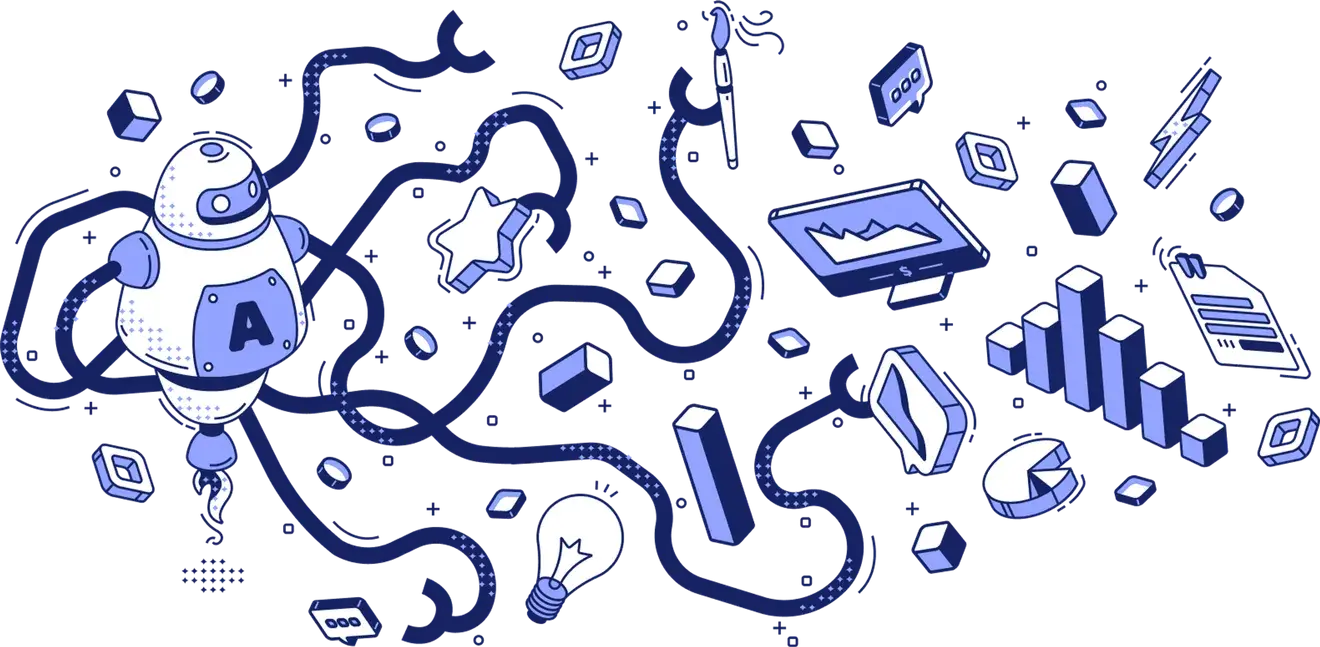Artificial Intelligence is rapidly transforming the world of DevOps, automating routine and complex tasks to boost efficiency and reduce errors. Read this article to discover how AI can revolutionize your DevOps workflows, the practical applications of these technologies, and the emerging trends that are shaping the future of DevOps.
Table of Contents
AI in Automating Routine DevOps Tasks
AI in Automating Complex DevOps Tasks
Benefits of Automation in DevOps
How to Use AI and ML in DevOps
Challenges and Considerations in DevOps
Future Prospects and Trends in DevOps
Imagine if your DevOps processes could be streamlined and supercharged with the power of Artificial Intelligence (AI). We’re talking about cutting down on repetitive tasks, making complex decisions faster, and keeping everything running smoothly with minimal human intervention. This article dives into how a DevOps team can take advantage of AI by automating both routine and complex tasks, making our work more efficient and less prone to errors.
The Role of AI in DevOps
First, let’s clarify what we mean by AI. AI involves creating systems that can think and learn like humans. There are three types of AI:
- Narrow AI (ANI): Designed for specific tasks, like chatbots.
- General AI (AGI): Possesses generalized human-like cognitive abilities.
- Superintelligent AI (ASI): Surpasses human intelligence (currently a theoretical concept).
In DevOps, automation means using tools to handle repetitive tasks, making processes like Continuous Integration/Continuous Deployment (CI/CD), infrastructure management, and testing more efficient.
AI in Automating Routine DevOps Tasks
How to use AI in DevOps? AI shines in automating routine DevOps tasks such as code testing, deployments, and monitoring. For code testing, automated tests run every time changes are made to the code. In deployment, pipelines automatically deploy your applications. Continuous monitoring tools keep an eye on your systems to ensure everything runs smoothly.
Artificial intelligence in DevOps plays a crucial role here by enhancing the capabilities of the following tools:
1. Predictive Analytics for Deployment
AI algorithms can analyze historical deployment data to predict potential issues, optimize deployment schedules, and recommend the best times for deployment, thereby minimizing downtime and reducing errors.
Several DevOps AI tools excel in this area. Splunk uses machine learning for operational intelligence, enabling predictive analytics on deployment data. New Relic One offers predictive analytics features to forecast system behavior and deployment impacts. DataRobot provides automated machine learning models to analyze historical data and predict deployment outcomes. H2O.ai is an open-source AI platform offering tools for building predictive models and integrating them into deployment processes.
2. Intelligent Automation in CI/CD Pipelines
AI can be integrated into CI/CD tools to automatically resolve conflicts, prioritize build jobs, and even rollback changes if certain anomalies are detected during the deployment process.
The following AI tools excel in this area. GitHub Copilot is an AI-powered code completion and generation tool that assists in writing and automating CI/CD pipeline scripts. Jenkins X integrates with Kubernetes and uses AI/ML for intelligent pipeline automation and management. Harness uses machine learning to analyze deployment patterns, detect anomalies, and automate rollback processes. Spinnaker can be integrated with AI tools to enhance its continuous delivery capabilities by predicting deployment issues and automating responses.
3. Enhanced Monitoring and Alerting
AI-driven monitoring tools can continuously learn from system performance metrics, detect anomalies, and automatically trigger alerts or even corrective actions to ensure systems are running optimally.
The next AI tools are the most prominent in this area. Dynatrace utilizes AI for automatic root cause analysis, anomaly detection, and predictive monitoring. Prometheus with Grafana and Thanos combine with machine learning libraries like TensorFlow or PyTorch for anomaly detection and predictive alerts. Datadog offers AI-powered monitoring features such as anomaly detection, forecasting, and automated alerting. Moogsoft provides AI-driven IT operations analytics (AIOps) to detect incidents, automate responses, and reduce noise alerting.
Our DevOps engineers successfully use these AI tools in their projects, continually implementing and optimizing them to improve efficiency and reliability. For instance, by integrating Splunk for predictive analytics, they can foresee deployment issues, ensuring smoother rollouts and minimal downtime.

AI in Automating Complex DevOps Tasks
AI isn’t just for simple tasks; it can handle complex ones too, like anomaly detection, predictive maintenance, capacity planning, automated security analysis, and dynamic infrastructure management. Read on to learn how these capabilities can transform your DevOps processes and drive efficiency.
For proactive issue resolution, using AI in DevOps allows systems to analyze logs and performance data to predict system failures or performance bottlenecks before they happen, allowing teams to take proactive measures. Tools that excel in this area include Splunk, Dynatrace, and Moogsoft.
To perform resource optimization, DevOps automation using machine learning enables models to forecast future resource needs based on current usage patterns and automatically adjust infrastructure to optimize both costs and performance. Tools used in this area include DataRobot, H2O.ai, and Prometheus with Grafana and Thanos.
For automated root cause analysis, AI can sift through vast amounts of log data to identify the root cause of issues more quickly than a human, significantly reducing the mean time to resolution (MTTR). Effective tools for this purpose are Moogsoft, Splunk, and Dynatrace.
To conduct automated security analysis, AI continuously scans for vulnerabilities and evaluates threats, proactively identifying risks and recommending fixes before they can be exploited. Key tools for this include Darktrace, Splunk, and Microsoft Azure Security Center.
To achieve dynamic infrastructure management, AI-driven tools automatically adjust resources in response to real-time demand and predictive analytics, ensuring both optimal performance and cost-efficiency. Key tools for this include Turbonomic, Google Kubernetes Engine (GKE) with AI, and Apache Spark with MLlib.
Our DevOps team is actively integrating these AI solutions into their workflows. For instance, using Dynatrace for anomaly detection has enabled us to maintain high availability and performance in our systems, while Moogsoft’s AIOps capabilities have significantly reduced the time it takes to identify and resolve issues.
Benefits of Automation in DevOps
-
Proactive Resolution: Identify and address issues early to prevent major problems and minimize downtime.
-
Better Resource Optimization: Efficiently allocate and use resources to enhance performance and reduce costs.
-
Improved Reliability: Improve system uptime and performance with predictive maintenance that anticipates and prevents failures.
AI ML in DevOps bring benefits for business: teams can achieve significant improvements in efficiency, reliability, and cost-effectiveness, positioning themselves at the forefront of technological innovation.
How to Use AI and ML in DevOps
Let’s explore how AI and ML can transform your DevOps tasks, boosting efficiency and innovation in your workflows. Here’s a look at practical ways to leverage these technologies effectively.
Anomaly Detection in Application Performance
Imagine you need to ensure your applications are running smoothly and detect issues before they affect users. To achieve this, you can follow these steps:
1. Monitoring Setup. Implement continuous monitoring with tools like Prometheus and Grafana to collect performance metrics.
2. Anomaly Detection. Use Moogsoft or Datadog for AI-driven anomaly detection. These tools can learn from historical data and identify deviations from normal behavior.
3. Alerting and Response. Configure these tools to automatically trigger alerts and run predefined scripts to address common issues or notify the DevOps team for more complex problems.
This approach allows for early detection of performance issues, reducing the mean time to resolution (MTTR), and increasing system reliability.
Predictive Maintenance for Infrastructure
Another critical aspect is preventing hardware failures to ensure high availability of your infrastructure. Here’s how to achieve it:
1. Data Integration. Collect sensor data and logs from your infrastructure using tools like Splunk or ELK Stack.
2. Machine Learning Models. Use Google Cloud AI or AWS IoT Analytics to create machine learning models that predict hardware failures based on collected data.
3. Automated Maintenance. Integrate these predictive models with your infrastructure management tools (e.g., Terraform, Ansible) to automate maintenance tasks such as disk replacements or server reboots before failures occur.
By implementing these steps, you can ensure proactive maintenance, reduce unplanned downtime, and improve hardware utilization.
Resource Optimization with AI
Optimizing resource utilization is essential for cutting costs and enhancing performance. Follow these steps to achieve optimal results:
1. Usage Data Collection. Use monitoring tools like Prometheus and CloudWatch to gather data on resource usage.
2. Predictive Modeling. Implement AI models using Turbonomic or H2O.ai to analyze current usage patterns and predict future resource needs.
3. Dynamic Scaling. Integrate these predictions with your cloud provider’s autoscaling features (e.g., AWS Auto Scaling, Google Kubernetes Engine) to automatically adjust resource allocation based on real-time demand.
Effectively implementing these strategies will result in better resource management, reduced expenses, and enhanced performance for your applications.
As you can see, integrating AI-driven solutions into your DevOps practices offers numerous benefits, ultimately leading to a more resilient and cost-effective infrastructure.
Challenges and Considerations in DevOps
While AI offers transformative benefits for DevOps, it’s important to be aware of the challenges that come with its integration. As you explore AI solutions, you’ll encounter several key considerations:
1. Technical Hurdles: Ensuring the quality of data, avoiding algorithm bias, and achieving seamless integration with existing tools and systems can be complex tasks.
2. Ethical Concerns: Issues such as job displacement and data privacy need to be carefully managed to maintain ethical standards.
3. Regulatory Issues: Compliance with complex regulations and industry standards is crucial for successful AI deployment.
Addressing these challenges with thoughtful planning and strategic approaches is essential to fully leverage AI in your DevOps practices.
Future Prospects and Trends in DevOps
As we look to the future, the role of AI and machine learning in DevOps is set to expand and evolve in exciting ways.
Emerging technologies in AI, such as explainable AI, will enhance transparency in decision-making processes, while AI-human collaboration tools will boost team productivity and improve decision-making capabilities.
We can expect to see trends such as the rise of AI-driven DevSecOps, which will seamlessly integrate security into DevOps processes. AI-based infrastructure management will optimize and automate resource allocation, while AI-assisted code reviews will enhance code quality and shorten review times.
In the long term, DevOps roles are expected to increasingly focus on strategic and high-value tasks, moving beyond routine operations. This shift will foster more efficient, reliable, and agile practices, transforming how teams develop, deploy, and manage software.
Embracing these advancements and trends will not only enhance your use of AI in DevOps processes but also position your organization at the forefront of technological innovation.
To Sum Up
AI has the potential to revolutionize DevOps by automating both routine and complex tasks, enhancing efficiency, and reducing errors. As AI technology evolves, its integration into DevOps will foster innovation and streamline operations. Keeping up with these advancements and exploring AI’s integration into our workflows will be essential for staying competitive in the tech industry.
Coherent Solutions: Your Go-To AI Tech Partner
Understanding how AI works is only the first step toward successful AI implementation. Achieving success requires a strategic partner with deep expertise and a proven track record. Coherent Solutions excels in delivering innovative, high-quality, and custom AI solutions.
Discover how our tailored AI services can transform your DevOps practices. Contact us today to start your journey towards a more efficient and innovative future.
Frequently Asked Questions
-
AI significantly boosts the automation of routine DevOps tasks, including code testing, deployments, and monitoring. AI-driven tools can forecast potential deployment issues, optimize timing, and automate CI/CD pipelines intelligently. Notable examples are Splunk for predictive analytics, GitHub Copilot for CI/CD automation, and Dynatrace for advanced monitoring and alerting.
-
AI improves resource optimization by analyzing usage patterns and predicting future needs. Tools such as Turbonomic and H2O.ai dynamically scale resources based on real-time demand, which helps reduce costs and boost application performance.
-
How does AI enhance security in DevOps practices?
AI enhances security by continuously scanning for vulnerabilities and conducting automated analyses. Tools like Darktrace and Microsoft Azure Security Center leverage AI to detect potential threats, recommend solutions, and automate responses, maintaining a proactive security stance. -
- Technical Hurdles: Ensuring high-quality data and smooth integration with existing tools.
- Ethical Concerns: Addressing issues such as job displacement and data privacy.
- Regulatory Issues: Complying with complex regulations and standards.
- These challenges necessitate careful consideration and strategic planning for successful AI integration into DevOps workflows.



